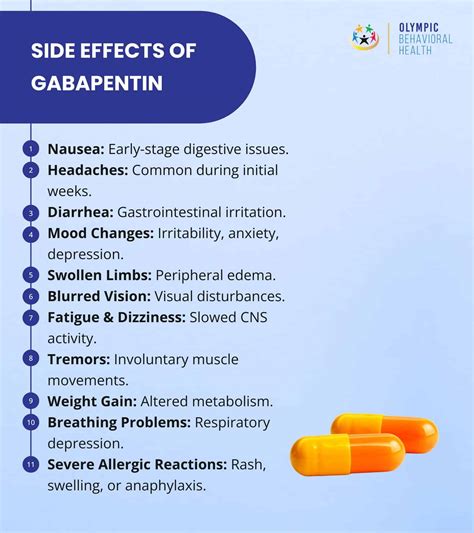Gabapentin Capsule: Usage & Side Effects Info

The gabapentin capsule has emerged as a versatile and widely prescribed medication, primarily used to treat partial seizures and neuropathic pain. Developed as an anticonvulsant, its mechanism of action, although not fully understood, is believed to involve the modification of calcium channel activity, which plays a pivotal role in nerve transmission. This unique mode of action not only underscores its efficacy in managing seizure disorders but also sheds light on its application in treating various types of neuropathic pain, including the pain associated with shingles (postherpetic neuralgia).
Usage Information
Gabapentin capsules are taken orally and can be administered with or without food. The dosage and frequency vary significantly based on the condition being treated, the patient’s age, and their renal function. For adults with postherpetic neuralgia, a typical starting dose might be 300 mg on the first day, 600 mg on the second day, and 900 mg on the third day, subsequently adjusted based on efficacy and tolerability. For patients with epilepsy, the dosing regimen might differ, often starting at a lower dose and gradually increasing as necessary and tolerated.
Potential Side Effects
As with any medication, gabapentin can cause a range of side effects. Commonly reported side effects include dizziness, drowsiness, and fatigue. Some patients may experience mood changes, such as depression, anxiety, or restlessness. Additionally, gabapentin can cause gastrointestinal side effects like nausea, vomiting, and diarrhea in some individuals. It’s also known to affect coordination and balance, potentially leading to falls, which is a particular concern for elderly patients or those with pre-existing mobility issues.
Serious Side Effects and Warnings
While less common, gabapentin can cause serious side effects that require immediate medical attention. These include severe allergic reactions, such as hives or difficulty breathing, and suicidal thoughts or behaviors. It’s also associated with an increased risk of seizures if abruptly discontinued, highlighting the importance of gradual dosage reduction under medical supervision. Furthermore, because gabapentin can exacerbate depression and anxiety in some patients, monitoring for mood changes is crucial, particularly in individuals with a history of psychiatric disorders.
Drug Interactions and Precautions
Gabapentin can interact with other medications, potentially altering their efficacy or increasing the risk of side effects. Notably, it can have significant interactions with other central nervous system depressants, such as opioids, benzodiazepines, and alcohol, leading to excessive sedation or respiratory depression. Additionally, its use in patients with renal impairment requires careful dose adjustment due to its reliance on renal excretion. Pregnant women or those planning to become pregnant should consult their healthcare provider, as data on the use of gabapentin during pregnancy is limited.
Long-Term Use Considerations
The long-term use of gabapentin has raised several considerations. One of the significant concerns is the potential for tolerance and dose escalation, as well as withdrawal symptoms upon cessation. There is also ongoing research into its effects on cognitive function, with some studies suggesting a possible link to cognitive decline in older adults. Furthermore, the misuse and abuse of gabapentin, particularly in combination with opioids, have been reported, highlighting the need for careful prescription practices and monitoring.
Conclusion
Gabapentin capsules represent a valuable treatment option for individuals suffering from epilepsy and neuropathic pain. However, their use must be carefully managed due to the risk of side effects, potential for drug interactions, and considerations related to long-term use. Patients should work closely with their healthcare providers to find an optimal balance between therapeutic efficacy and minimizing adverse effects. Moreover, the ongoing education of healthcare professionals and patients about the proper use, potential risks, and benefits of gabapentin is crucial for maximizing its therapeutic potential while ensuring safety.
Frequently Asked Questions
What is the primary use of gabapentin capsules?
+Gabapentin capsules are primarily used to treat partial seizures and neuropathic pain, including postherpetic neuralgia.
Can gabapentin cause serious side effects?
+Yes, gabapentin can cause serious side effects, including severe allergic reactions, suicidal thoughts or behaviors, and an increased risk of seizures if discontinued abruptly.
How should I take gabapentin capsules?
+Gabapentin capsules should be taken orally, with or without food, and the dosage and frequency will depend on the condition being treated and individual patient factors.
Can gabapentin interact with other medications?
+Yes, gabapentin can interact with other medications, including central nervous system depressants and drugs that are affected by renal excretion, requiring careful dose adjustment and monitoring.
Resources for Further Information
For individuals seeking more detailed information on gabapentin, including its full prescribing information, patient medication guides, and resources for managing side effects, several resources are available: - The official FDA website provides comprehensive drug information, including warnings, side effects, and dosage instructions. - Pharmaceutical company websites often offer detailed product information, patient assistance programs, and medication guides. - Healthcare provider consultations are invaluable for personalized advice and monitoring throughout treatment.
By understanding the usage, potential side effects, and long-term considerations associated with gabapentin capsules, patients and healthcare providers can work together to optimize treatment plans and improve patient outcomes.



